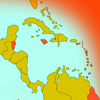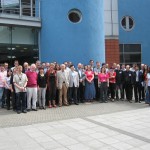
Researchers in the school have been awarded a two year project to address weather related climate change hazards and impacts for the Caribbean region.
Managers and policy makers in the Caribbean require knowledge of the likely impacts and hazards arising from climate change that are specific to their geographical location and that are relevant to their planning time-horizons (e.g. the short term (2030s) and the longer term (2080s)). However, current climate model projections of the weather are of limited use in this respect due to scale and bias issues. A web service will be developed to address this need through the adaptation and provision of leading weather-generator models from the EARWIG [1] and the UKCIP09 [2] climate knowledge systems. These weather generator models will be used to provide locally relevant weather projections based on the best available observed data and climate model outputs for the region.
Preliminary use of the new web service will be for impacts studies and training programs with stakeholders. This will feed through to management decisions and policy developed to address the specific hazards and impacts of climate change on the region.
The project is funded by the Climate and Development Knowledge Network (CDKN) and work will be carried out in partnership with the Caribbean Community Climate Change Centre (Belize), University of East Anglia, University of the West Indies and the Institute of Meteorology (Cuba).
References
1 Kilsby, C.G., Jones, P.D., Burton, A., Ford, A.C., Fowler, H.J., Harpham, C., James, P., Smith, A. and Wilby, R.L. 2007. A daily weather generator for use in climate change studies. Environmental Modelling and
Software, 22, 1705-1719.
http://www.ncl.ac.uk/ceg/research/publication/39922
2 Jones, P.D., Kilsby, C.G., Harpham, C., Glenis, V., and Burton, A., 2009. UK Climate Projections science report: Projections of future daily climate for the UK from the Weather Generator. University of Newcastle,
UK. ISBN 978-1-906360-06-1,
http://ukclimateprojections.defra.gov.uk




